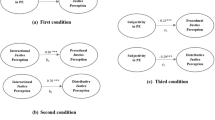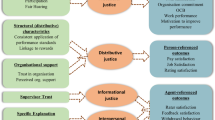Abstract
Despite the potential for conflict in performance appraisal, researchers have devoted little time and attention to justice concerns when studying this process. The present study used scenarios to investigate the effect of distributive, procedural, and interactional justice mechanisms on responses to performance appraisal reviews. Results suggest that multiple justice mechanisms in the same context may interact to influence perceptions of fairness, satisfaction, and commitment. Practical implications for conducting performance reviews in organizations are discussed.
Similar content being viewed by others
REFERENCES
Adams, J. S. (1963). Toward an understanding of inequity. J. Abnormal Soc. Psychol. 67: 422–436.
Bies, R. J. (1987). The predicament of injustice: The management of moral outrage. In Cummings, L. L., and Staw, B. M. (eds.), Research in Organizational Behavior, JAI Press, Greenwich, CT, pp. 289–319.
Bies, R. J., and Shapiro, D. L. (1988). Voice and justification: Their influence on procedural fairness judgments. Acad. Management J. 31: 676–685.
Bretz, R. D., Milkovich, G. T., and Read, W. (1992). The current state of performance appraisal research and practice: Concerns, directions, and implications. J. Management 18: 321–352.
Brockner, J., and Wiesenfeld, B. M. (1994). The interactive impact of procedural fairness and outcome favorability: The effects of what you do depend on how you do it. Paper presented at the annual meeting of the Academy of Management, Dallas.
Conlon, D. E., Lind, E. A., and Lissak, R. I. (1989). Nonlinear and nonmonotonic effects of outcome on procedural and distributive fairness judgments. J. Appl. Soc. Psychol. 19: 1085–1099.
Earley, P. C., and Lind, E. A. (1987). Procedural justice and participation in task selection: The role of control in mediating justice judgments. J. Pers. Soc. Psychol. 52: 1148–1160.
Folger, R. (1987). Reformulating the preconditions of resentment: A referent cognitions model. In Masters, J. C., and Smith, W. P. (eds.), Social comparison, social justice, and relative deprivation: Theoretical, empirical, and policy perspectives, Erlbaum, Hillsdale, NJ, pp. 183–215.
Folger, R. (1993). Reactions to mistreatment at work. In Murnighan, J. K. (ed.), Social Psychology in Organizations: Advances in Theory and Research, Prentice Hall, Englewood Cliffs, NJ, pp. 161–183.
Fried, Y., Tiegs, R. B., and Bellamy, A. R. (1992). Personal and interpersonal predictors of supervisors' avoidance of evaluating subordinates. J. Appl. Psychol. 77: 462–468.
Greenberg, J. (1987). Reactions to procedural injustice in payment distributions: Do the ends justify the means. J. Appl. Psychol. 72: 55–61.
Greenberg, J. (1991). Using explanations to manage impressions of performance appraisal fairness. Employee Responsibilities and Rights Journal 4: 51–60.
Ilgen, D. R., and Feldman, J. M. (1983). Performance appraisal: A process focus. In Staw, B. M., and Cummings, L. L. (eds.), Research in organization behavior, JAI Press, Greenwich, CT, pp. 141–197.
Ilgen, D. R., Peterson, R. B., Martin, B. A., and Boeschen, D. A. (1981). Supervisor and subordinate reactions to performance appraisal sessions. Organizational Behavior and Human Performance, 28: 311–330.
Landy, F. J., and Farr, J. L. (1980). Performance rating. Psychol. Bull. 87: 72–107.
Lind, E. A., and Lissak, R. I. (1985). Apparent impropriety and procedural fairness judgments. J. Exper. Soc. Psychol. 21: 19–29.
Lind, E. A., and Tyler, T. R. (1988). The Social Psychology of Procedural Justice, Plenum, New York.
Mowday, R. T. (1991). Equity theory predictions of behavior in organizations. In Steers, R. M., and Porter, L. W. (eds.), Motivation and Work Behavior, McGraw-Hill, New York, pp. 111–131.
Schaubroeck, J., May, D. R., and Brown, F. W. (1994). Procedural justice explanations and employee reactions to economic hardship: A field experiment. J. Appl. Psychol. 79: 455–460.
Schuler, R. S., and Huber, V. L. (1993). Personnel and human resource management (5th ed.), West Publishing, St. Paul, MN.
Thibaut, J., and Walker, L. (1975). Procedural Justice: A Psychological Analysis, Erlbaum, Hillsdale, NJ.
Tyler, T. R., and Bies, R. J. (1990). Beyond formal procedures: The interpersonal context of procedural justice. In Carroll, J. S. (ed.), Applied Social Psychology and Organizational settings, Erlbaum, Hillsdale, NJ, pp. 77–98.
Villanova, P., Bernardin, H. J., Dahmus, S. A., and Sims, R. L. (1993). Rater leniency and performance appraisal discomfort. Educational and Psychological Measurement 53: 789–799.
Weiner, B. (1985). An attributional theory of achievement motivation and emotion. Psychol. Rev. 92: 548–573.
Author information
Authors and Affiliations
Rights and permissions
About this article
Cite this article
Holbrook, R.L. Managing Reactions to Performance Appraisal: The Influence of Multiple Justice Mechanisms. Social Justice Research 12, 205–221 (1999). https://doi.org/10.1023/A:1022196301372
Issue Date:
DOI: https://doi.org/10.1023/A:1022196301372




